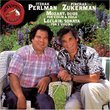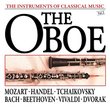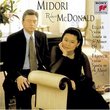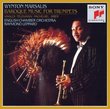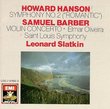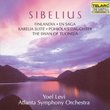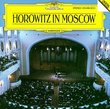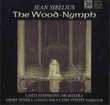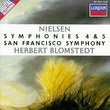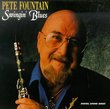| All Artists: Samuel Barber, David Zinman, Baltimore Symphony Orchestra Title: Barber: Adagio; Symphony No. 1; The School for Scandal; Essays Members Wishing: 0 Total Copies: 2 Label: Decca / Argo Release Date: 10/13/1992 Genre: Classical Styles: Forms & Genres, Theatrical, Incidental & Program Music, Historical Periods, Modern, 20th, & 21st Century, Symphonies Number of Discs: 1 SwapaCD Credits: 1 UPCs: 028943628822, 002894362882 |
Search - Samuel Barber, David Zinman, Baltimore Symphony Orchestra :: Barber: Adagio; Symphony No. 1; The School for Scandal; Essays
 | Samuel Barber, David Zinman, Baltimore Symphony Orchestra Barber: Adagio; Symphony No. 1; The School for Scandal; Essays Genre: Classical If you've got Schippers's superb Barber collection on Sony, then this is the only other Barber disc you are likely to need. Three of the pieces overlap, true, but the Symphony No. 1, the Music for a Scene from Shelley, and... more » ![header=[] body=[This CD is available to be requested as disc only.]](/images/attributes/disc.png?v=15401716) ![header=[] body=[This CD is available to be requested with the disc and back insert.]](/images/attributes/disc_back.png?v=15401716) ![header=[] body=[This CD is available to be requested with the disc and front insert.]](/images/attributes/disc_front.png?v=15401716) ![header=[] body=[This CD is available to be requested with the disc, front and back inserts.]](/images/attributes/disc_front_back.png?v=15401716) |
Larger Image |
CD DetailsSynopsis
Amazon.com If you've got Schippers's superb Barber collection on Sony, then this is the only other Barber disc you are likely to need. Three of the pieces overlap, true, but the Symphony No. 1, the Music for a Scene from Shelley, and the Essay No. 1 are all unique to this disc, and together the two CDs will give you the essential Barber for orchestra. All of this music is extremely easy on the ear, but at the same time so commanding in utterance that it's hard to believe that Barber was considered a regressive, backward-looking composer during his lifetime. Now, when everyone is taking up the cause of tonality and melody once again, he sounds positively prophetic. David Zinman's performances are as fine as Schippers's, which is to say just about perfect. --David Hurwitz Similarly Requested CDs
|
CD ReviewsBarber's First is an unsung masterpiece. Into | everywhereandnowhere | 07/17/2000 (5 out of 5 stars) "As symphonies go, Barber's First is an "unsung hero." Even the composer didn't give it anywhere near the credit that it deserves. I have approximately 4,000 CD's, of which @3,000 are classical CD's, and this remains one of my all time favorite "albums." "The Symphony" is my favoite "classical genre." I have recordings of more than 300 symphonies from all eras, and Barber's First would easily be counted among my 25 favorites; and despite the merits of excellent works in this genre by Copland, Harris, Hanson, and Schuman, among others, Barber's First is my favorite "American Symphony." The performances and recording are about as perfect as they can be, and this is one of those rare surveys of a composer's music that can be confidently called, "definitive." Listeners familiar with Sibelius' Seventh may notice a similarity in form between the two works, and Barber did indeed intend to emulate Sibelius' concise four-sections-in-one movement symphonic form. I feel that Barber's first is every bit as effective as Sibelius' valedictory statement on the genre. Barber's First goes well with his two best Essays for Orchestra, because it seems like a tightly constructed, passionately argued, extended essay in itself. The first section, which is about twice as long as any of the subsequent three, is launched with a drum roll and layers of orchestral sound quickly built up like glowing storm clouds gathering at dusk. After this passionate opening statement, Barber ardently introduces the themes of each of the three attaca sections that follow. The tumultuous second section roughly corresponds to a symphonic scherzo. The slow, introspective third section, which begins with one of the most raptly beautiful themes I've ever heard, is built up masterfully from piannisimo oboe and string pizzicatos to full orchestra. The fourth section serves as a finale - and what a finale! - built up to a satisfyingly unresolved-sounding conclusion, with a surge of momentum driven by majestic brass and resounding bass drum. The rest of the pieces on this disc are wonderful, as well, especially the two greatest of Barber's three "Essays," which have an epic sweep and an atmosphere of twilight on great American expanses. To me, an atmosphere of rapt twilight, glowing on mesas and mountains, has always pervaded these pieces, but that's obviously the most subjective part of my review. Zinman's interpretations, and his wonderful orchestra's performances, are as passionately and concisely argued as Barber's compositions, and the sound has amazing depth and dynamic range which gives a crispness of attack to the brass and percussion so important to this music, but with a breadth and fullness that is generally missing from Jarvi's and Slatkin's recordings. This orchestra's beautiful string sound comes across ripe and full, as well. Barber's First is one of the last great Romantic symphonies, and deserves more recognition as one of the truly great works of American music, as well as the "classical repertoire." Yes, this may very well be "the only Barber disc you'll ever need," as this disc also includes my favorite performance and recording of the ubiquitous, but no less beautiful, "Adagio."" First reviewer! littlenomad | North Carolina, US | 01/09/2000 (5 out of 5 stars) "This was one of the first classical CDs I ever purchased...and to date, I think it has been my favorite. I can't believe no one has reviewed it yet! The music is, of course, the most important aspect of this release, but the cover, photos, and liner notes are all top notch. If I am not mistaken, the notes give information even on the equipment used in recording. Zinman's approach to the pieces seems just right: never too fast, never too slow. The orchestra covers the entire dynamic (and dramatic) range over the course of the selections...coming in like a lamb and out like a lion. Some of the pieces are strange upon a first listen, but subsequent quiet evenings spent with this CD as a companion, and all is forgiven. Even if the other selections are to harsh, buying the CD for Adagio for Strings alone is worth it. Fans of Gorecki's Symphony of Sorrowful Songs and the slow movement of Mahler's 5th should love this." Really Enjoyable Program Karl W. Nehring | Ostrander, OH USA | 07/16/2009 (4 out of 5 stars) "The sound quality on this recording is full, blooming, robust--the digital equivalent of the old "FFRR" sound featured on London's budget-priced Stereo Treasury Series recordings of the '60s and '70s, recordings I used to love as a student with a limited budget because they made my small speakers sound bigger. Barber's music is likewise full, blooming, and robust, the end result being a really enjoyable program of 20th-century American music. And hey, it will make your small speakers sound bigger and your big speakers sound gigantic. What more can you ask for in a CD?"
|

